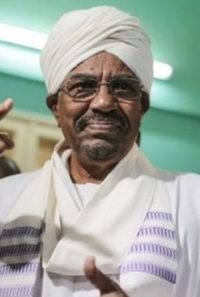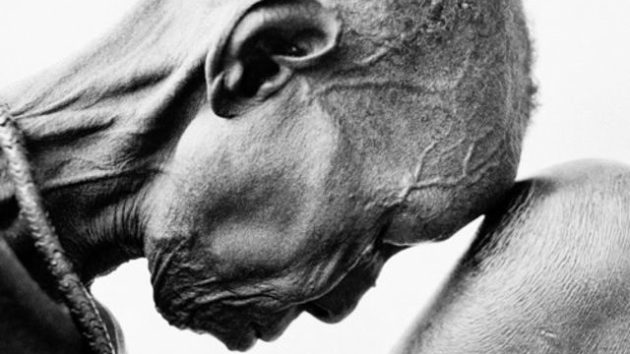The Secret Radical Islamic Document found in Darfur, Sudan
Background

Sudan President Omar al-Bashir in Power since 1989.
In a January 18, 2017 FrontPage Magazine article, “Obama Lifts Sudan Sanctions”, we reported on the lifting of 20 years of sanctions against the regime of President Omar al-Bashir for making progress against counterterrorism in the Sudan. All while he was preparing to launch a Jihad army of 150,000 recruited from across the Sahel region and the Middle East, including the Islamic State. Many of those jihadists were recruited from Islamic terrorist groups from Libya, neighboring Chad, the Central African Republic, Mali and Niger. They were undergoing training in 16 camps around Khartoum. These cadres were composed of formations of Janjaweed/Rapid Support forces now renamed ‘Peace Forces’. By early February 2017, the Bashir regime completed training of 34,000 ‘Peace Force’ militia at the Kerere and Fatasha camps near Khartoum. 2,500 of these Peace force militia, equipped with heavily armed militarized Hi-Lux Toyota pickup trucks, are already at the Jadeed al Sail training camp in the North Darfur capital of Fashir. Bashir’s jihad army is already on the attack in Darfur.
To understand the Jihad doctrine behind Bashir’s strategy we are presenting the underlying doctrinal strategy found in a captured secret document, the Arab Coalition Guresh 1 and 2. Guresh is the name for the Prophet Mohammed’s tribe in Arabia, used by the people for themselves.
The Arabic Language version of a Sudan Arab Coalition document of 11 pages was captured during the fighting between the Rapid Support Forces (RSF) (Reorganized Janjaweed Militias) and Darfur rebels in October 2014 in Donky Hush, North Darfur. The document was found in an abandoned military truck belonging to the RSF. It was translated by Lt. General Abakar N. Abdallah, Chairman of the Sudan United Movement in April 2015 to document the genocidal Jihad doctrine underlying the ethnic cleansing of Darfur, the Nuba Mountains Blue Nile Region and South Kordofan.
The document, containing different Guresh statements of the Sudan Arab Coalition project, was created in 1987 by former Sudan Prime Minister Sadiq al-Mahdi who founded the Janjaweed militias. Al Mahdi and the late Islamic reformer Hassan al-Turabi had drafted in the 1960’s the Islamic manifesto to rule Sudan under Sharia Islamic law creating the Arabization and Islamization policies. Those policies are currently being implemented by his usurper, indicted war criminal President Omar al-Bashir. They form the core of the Jihad doctrine found in the Arab Coalition document.
Al-Mahdi is the great grandson of Muhammad Ahmad, who declared himself the Mahdi, “the guided one” in Arabic, who would rule until the Day of Judgment under Islamic doctrine. The Mahdi established a Sharia ruled Caliphate in the Sudan in 1881 directed at invading Egypt seeking to overturn the infidels; the Khedive Egyptian ruler and his British allies. The Mahdi’s army conducted a siege at Khartoum resulting in its capture and the death of valiant British Major General Sir Charles Gordon in 1885. The Mahdi’s Caliphate ended with the reconquest of the Sudan by a combined British – Egyptian force under General Sir Herbert Kitchener at the Battle of Omdurman on September 2, 1898 that defeated an army led by the Mahdi’s successor Abdullah al-Taashi. The Sudan campaign was chronicled in Sir Winston Churchill‘s The River War: An Account of the Reconquest of the Sudan. The British subsequently reached a settlement with the Al-Mahdi family in 1910 bestowing on them a fortune of 110,000 pounds Sterling.
The Anglo-Egyptian Sudan established in 1902 ended with the declaration of the Republic of Sudan in 1956. Almost immediately a more than half century civil war broke out between the Arab north versus the indigenous African tribes in the South resulting in the creation of South Sudan as a new nation in 2011. Notwithstanding, the genocidal campaign, articulated in the Arab Coalition document, Jihad continued with open warfare against resistance forces in the Darfur, Nuba Mountains and Blue Nile region in South Kordofan.
Sadiq Al-Mahdi, an Oxford graduate, was overthrown in 1989 by then General now President Omar al-Bashir. Al-Mahdi went into exile for several purposes: 1) to gain credibility of opposition groups and militias; 2) to obtain popular support both in Sudan and externally; 3) to obtain support from Arab countries; 4) to eradicate armed rebellions to defend Arab supremacy in Sudan; and, 5) to rally opposition forces to weaken the regime. He returned in 2017 at the age of 80 to exploit current weaknesses of the Bashir regime seeking to replace it as the main Arab regime in Khartoum.
Objectives of the Arab Coalition Document
The Arab Coalition document carries forward the basic Jihad doctrine through the latest available edition in 2014. The central objective of the Arab Coalition document is to eradicate the people of Darfur and occupy the land by 2020. The most important part of this document is the evaluation of 2014 in which they distributed the entire Darfur region to different Arab tribes with the intention of completing their project by 2020. If the Arab Coalition plan is left unchecked by resistance forces, then Janjaweed militias will commit more genocidal atrocities in Darfur to complete their task.
The essential document declaring the creation of the Arab Assembly against Darfur was issued in March 1987. It was renewed following the evaluation of its advantages and disadvantages as well as the objectives that had been achieved in 1992. After 11 years, the implementation of the document was renewed in 2003. However, the objective of ethnic cleansing Darfur and other parts of Sudan was hampered by internal problems occurring between the Arab tribes: lack of adequate resources, the starting of rebellion in the Darfur region from non-Arab tribes, and the support of the international community to the Darfur cause. Sudan had been placed on the list of state sponsors of terrorism. An indictment was prepared by the International Criminal Court at The Hague directed against Sudan government officials accusing them of committing war crimes, crimes against humanity, and genocide in Darfur. Among those indicated were President Omar al- Bashir, Musa Hilal, Ahmed Haroun, and Ali Kosheeb.
Other problems emerged to prevent achievement of the Arab Coalition objectives. Some members diverted the funds collected for the purpose of executing this plan for personal benefits. Some tribes who initially agreed to support the project withdrew when they perceived that this project was not in their interest in the long term. They were effectively executing plans that at the end would destroy them.
Note these objectives listed in the Arab coalition document:
- Seize all livestock and resources from indigenous tribes;
- Kill their representatives, educated leaders and confine the rest of indigenous tribes in big cities, prisons, or kill them whenever there is an opportunity;
- Keep all government resources that can assist people on making complaints, or can be used in emergence cases, transportation, or communication so that they could not communicate between one another;
- Place camps of Arab fighters (Janjaweed) on high mountains so that the attackers cannot approach them; and
- Attack areas that have strong resistance with large forces.
According to the Arab Coalition document The Higher Committee of the Arab Assembly carried out the following tactical program to achieve jihad objectives:
- Create difficulties in the way of the regional governments and use all resources available so as not to be able to execute their policies and programs of development; ?
- Do everything possible to disrupt government services in the areas occupied by non-Arab tribes in order to make them feel the government weakness and its failure to provide necessary means for life; ?
- Increase the volunteers in areas occupied by non-Arab tribes to create insecurity problems, stop production and kill their leaders; ?
- Create disputes between non-Arab tribes to prevent unification. ?
The members of the Assembly occupying senior positions are obliged to do the following:
- Concentrate on providing services to the areas of the Arab Assembly;
- Do not employ non-Arabs in important positions;
- Create obstacles for those non-Arabs who occupy positions and work in administration;
- Try by all means to create instability in schools in non-Arab populated areas; and
- Whenever there is an opportunity kill them.
The projected timetable to achieve the Jihad war objectives in Darfur was six years from 2014 by which time the Arab Assembly was to finish the ‘ jihad project’ in 2020. As the Arab Assembly had not been able by 2014 to execute the project, the Executive Committee divided the rest of the areas of the Darfur region. That would allow new comers to settle in and work fast to complete the project; meaning replacement of indigenous African tribes with Arab settlers.
You may read the translated Arab Coalition document here.
ABOUT LIEUTENANT GENERAL ABAKAR N. ABDALLAH
Lt. Gen. Abakar N. Abdallah is Chairman of the Sudan United Movement. He is a native of North Darfur who joined the Sudan Liberation People’s Army (SPLA) in 1984 and became active in the Nuba Hills and Darfurian resistance. In 1989 he joined the Patriotic Salvation Movement in neighboring Chad based in Darfur. He served as an officer in the Chadian army for 23 years. He held senior intelligence and counterterrorism posts including as Coordinator of the Multi-National Joint Task Force of Nigeria, Chad and Niger. He is a December 2002 graduate of the Intelligence Officers’ Advanced and Combating Terrorism Courses, US Army Intelligence Center and Schools, Fort Huachuca, Arizona. He was a Graduate Terrorism Fellow and is a Graduate of the College of International Security Affairs, National Defense University, Washington, DC, 2005. He was an International Fellow and Graduate of the US Army War College, Class of 2008.
ABOUT DEBORAH MARTIN
Deborah Martin is a long-term American Sudan human rights advocate having lived in both North and South Sudan conducting development projects as a professional engineer and linguist in a team with her late husband. She has worked on research linguistics of Jieeng, Nuer, Bari, Jumjum, Masalit, Nubian, Luwo, Reel, Madi and Moro. She has been working in North and South Sudan for 35 years as a linguist and cultural consultant following the situation as it developed. Her interview skills have brought the story even when media reporting has been limited.



Trackbacks & Pingbacks
[…] published the details of the regime’s agenda of the secret Arab Coalition Plan that Abdallah recovered in […]
Leave a Reply
Want to join the discussion?Feel free to contribute!